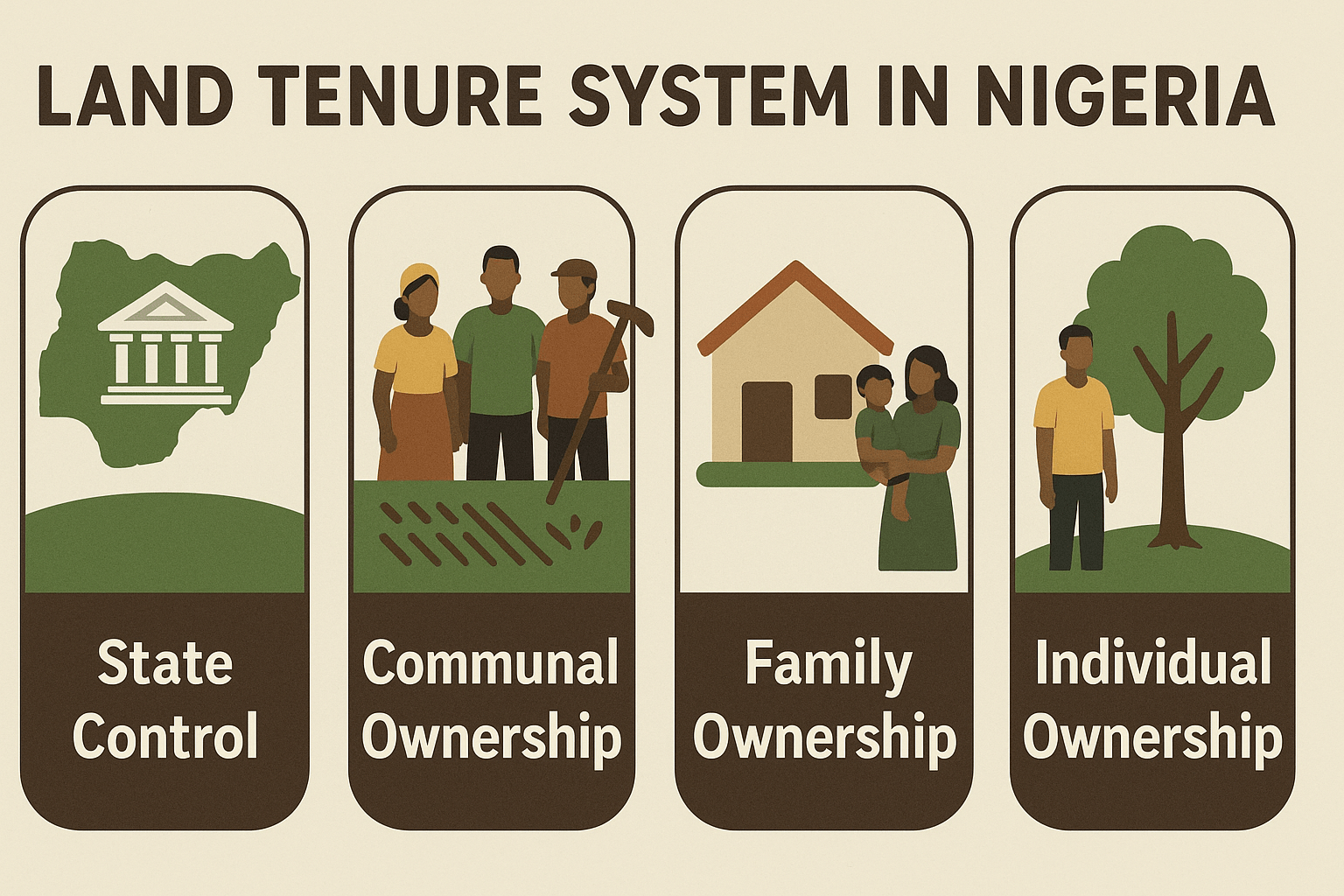This Abuja‑focused guide explains the Land Tenure System in Nigeria in clear steps — what it means, how rights are granted, what papers you should see, and how to avoid mistakes. You’ll get examples from Jahi, Katampe Extension, Karsana, Guzape, and more, plus a complete due‑diligence checklist and a C of O walkthrough.
Get titled plots and serviced land shortlists in Abuja today.


Land Tenure System in Nigeria affects how you buy, sell, transfer, or inherit land. If you’re shopping for land in Abuja, you need to know which authority issued the right, what documents prove it, and how to perfect title. This guide keeps the law simple and shows the exact checks that protect your money when you evaluate plots across the FCT.
What tenure means in practice
Tenure describes who holds the legal right to occupy and use land. In Nigeria today, decades after the 1978 Land Use Act, practical ownership works through rights of occupancy. Abuja follows this model strictly. You don’t chase “absolute freehold.” You trace a right of occupancy and perfect it with the right paperwork.
- Statutory Right of Occupancy — urban land rights granted by the Governor or FCT authority; proven by a Certificate of Occupancy (C of O) or allocation/letter while C of O is processing.
- Customary Right of Occupancy — non‑urban land rights recognised and issued by a Local Government; regularisation may be needed in the FCT if the area transitions to an urban layout.
Most transactions you’ll meet in Abuja trace to one of these two grants. Your job is to identify which one you’re buying, then confirm the chain of title and all required consents and registrations.
Seven practical tenure paths you’ll meet in Abuja
1) Statutory right of occupancy
Issued for urban land. Proof includes a C of O or a statutory allocation while the C of O is being produced. Common in serviced estates and districts such as Jahi and Katampe Extension.
2) Customary right of occupancy
Recognised for non‑urban land by Local Government. Around growing corridors (for example parts of Karsana or Gwagwalada), regularisation and conversion may apply as layouts change.
3) Leasehold
A time‑bound right from the existing grant holder. Perfect with a Deed of Sub‑Lease, then obtain consent and register the deed.
4) Assignment/Conveyance
Transfer of an existing right of occupancy from seller to buyer. Requires Governor’s consent for statutory grants and proper registration.
5) Inheritance
Devolution under a will or intestacy. The estate is perfected through probate or letters of administration, followed by any required consent and registration.
6) Gift (inter vivos)
Gratuitous transfer of a right of occupancy documented by a Deed of Gift. Consent and registration rules still apply.
7) Government allocation
Direct plot allocation by government or its agencies. Documents usually include allocation letter, receipts, and eventual C of O issuance.
Comparison — documents, issuers, and perfection
| Path | Core document | Issuer | Typical Abuja use | Perfection |
|---|---|---|---|---|
| Statutory right | Certificate of Occupancy | Governor/FCT authority | Urban estates, serviced plots | Consent, stamping, registration |
| Customary right | Customary grant/register | Local Government | Peri‑urban corridors | Council record; convert to statutory if applicable |
| Leasehold | Deed of Sub‑Lease | Existing holder | Commercial sites, mixed‑use | Consent and registration |
| Assignment | Deed of Assignment | Seller (assignor) | Secondary sales | Consent and registration |
| Inheritance | Probate/Letters | High Court | Family assets | Perfection after vesting |
| Gift | Deed of Gift | Donor | Family transfers | Consent and registration |
| Government allocation | Allocation → C of O | Government/Agency | New layouts, districts | C of O issuance and registration |
Abuja examples buyers understand
- Jahi/Katampe Extension — common to see statutory grants in serviced layouts. Expect C of O or allocation evidence plus receipts.
- Karsana — rapid expansion. Confirm layout status, regularisation steps, and any required conversion before payment.
- Guzape — premium urban district where statutory documentation is the norm. Be strict on consent and registration history.
- Gwagwalada/Bwari corridors — check whether the site sits under a customary framework and what the pathway is to statutory title if the area is re‑planned.
Tell us your budget and preferred districts. We’ll shortlist options with clear paper.
Due‑diligence checklist you should follow
- Identify the grant — statutory or customary; obtain the grant evidence and any allocation letters.
- Survey and charting — confirm boundaries, encumbrances, and government interests.
- Seller authority — confirm the person/entity has the right to sell or assign; match names across documents.
- Consents and registration — check Governor’s consent on assignments/leases and confirm registration entries.
- Ground rent and charges — obtain receipts and confirm no arrears are outstanding.
- Zoning and use — confirm planning permissions align with your intended use.
- Professional review — use a property lawyer and a registered surveyor. Small fees prevent large losses.
Converting customary holdings to statutory title in the FCT
As peri‑urban areas shift into planned urban layouts, customary plots can be regularised. Expect planning compliance checks, fees, and eventual issuance of a statutory grant followed by C of O. Keep every receipt and letter in sequence — regularisation depends on clean records.
How to obtain a Certificate of Occupancy (C of O)
- Apply — complete the form with survey/site plan, tax clearance, passports, and ID.
- Verification & charting — authority confirms boundaries and searches for encumbrances.
- Inspection — physical site visit and report.
- Fees & ground rent — pay assessed charges and initial rent.
- Issuance & registration — C of O is signed; registration perfects title.
Processing steps vary by state. Always follow current guidance from your land authority.
Common pitfalls buyers report — and how to avoid them
- Unverified “freehold” — treat the term as shorthand. Ask for the real grant and documents.
- Missing consents — an unconsented assignment can undermine title. Confirm consent and registration.
- Encumbrances — debts, disputes, or overlapping claims. Chart and search every plot.
- Wrong zoning — buying a plot unsuitable for your intended use. Check the layout and planning first.
- Payment before evidence — don’t move funds until documents pass basic checks.
We line up titled plots with clean paper and schedule site inspections.
Documents pack you should request
- Survey plan and charting report
- Evidence of grant — statutory or customary; allocation letter where applicable
- Certificate of Occupancy or evidence of C of O processing
- Deed of Assignment or Sub‑Lease, plus Governor’s consent where required
- Receipts for payments, ground rent, and charges
- Any building approvals and layout compliance letters
Mini case examples from Abuja buyers
Case A, Jahi: Buyer receives allocation evidence and C of O in process. We verify charting, confirm no encumbrances, and perfect the assignment with consent. Handover proceeds without dispute.
Case B, Karsana: Plot advertised as freehold. Our checks show customary roots that require regularisation. Buyer adjusts timeline and costs, then proceeds once the path to statutory title is documented.
Case C, Guzape: High‑value plot with prior lease records. Missing consent on an older transfer. Seller resolves consent and registers the instrument before closing, preventing a future challenge.
Key takeaways
- The Land Tenure System in Nigeria runs through rights of occupancy — statutory in urban areas, customary in non‑urban.
- Abuja buyers should verify the specific grant, then track documents and registration steps end‑to‑end.
- Use professionals, check zoning, and don’t disburse funds until documents pass checks.
FAQs
Is there still freehold in Abuja?
No. Abuja follows the Land Use Act. What many call freehold usually traces to a right of occupancy. Verify the grant and perfect transfers.
How long does a statutory right last?
Up to 99 years, subject to compliance and renewal.
What exactly proves title today?
Grants and perfected documents — C of O, registered deeds, proper consents, and clear charting/surveys.
What should I check before paying?
Grant type, charting and encumbrance search, seller authority, consents/registration, ground rent, and zoning.
How do I convert customary land in the FCT?
Regularise through the authority, satisfy planning and fees, receive a statutory grant, then obtain and register the C of O.
Where do I start if I want titled plots?
Browse Abuja properties or talk to A.I Realent for a shortlist and inspections.
Tell us your budget and district. We’ll shortlist secure plots and schedule site visits.
Sources
Always confirm with the latest notices from your land authority and the Land Use Act. Use a lawyer and a registered surveyor for verification and perfection.


![Freehold Land Tenure System in Nigeria: Complete Guide [2025] 6 Land tenure min](https://airealent.ng/wp-content/uploads/2025/10/Land-tenure-min-592x444.png)